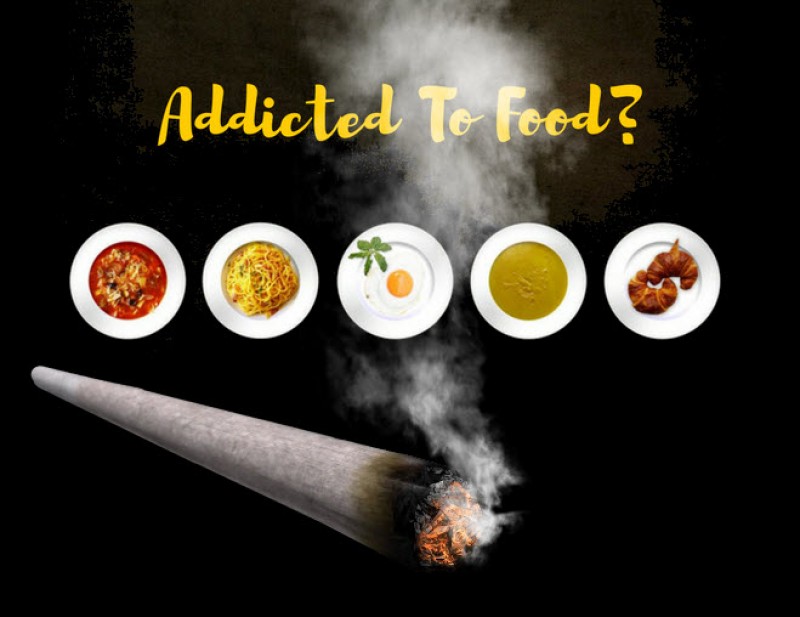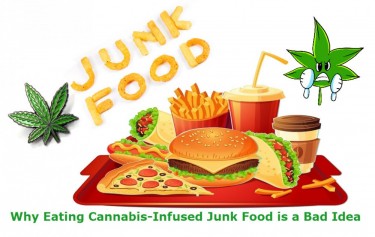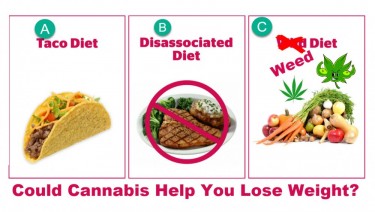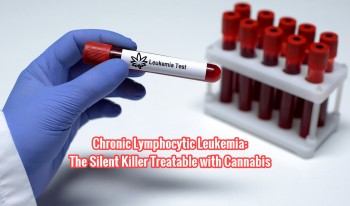Cannabis For Food Addictions - Can It Help or Does it Create Overeating Problems?
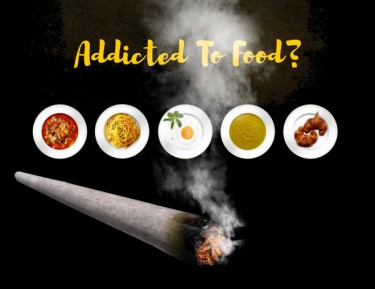
Millions of people all over the world suffer from addictions of one kind or another.
Some of the most common addictions afflicting people include tobacco, alcohol, painkillers, cocaine, and heroin. However, most people don’t realize that it’s far too easy to get addicted to things that are perfectly legal: there’s the addiction to alcohol, which one can easily purchase. But one serious matter people don’t talk about often is the addiction to FOOD.
Studies have shown that for people addicted to food, the reward centers of the brain are activated in the same way that heroin and cocaine do. This is particularly true when people are addicted to food that is high in sugar, salt, and fat – some of the most addicting ingredients that also happen to be things we eat everyday. Just like addictive drugs, these ingredients trigger the release of dopamine and other feel-good chemicals.
When someone is addicted to their favorite food, these reward signals eclipse the signals of being full. And this is why people tend to continue eating long after they’re actually full. This is compulsive overeating, just one of the many kinds of behavioral addictions.
The Role of Stress
We may not realize it, but stress actually causes us to reach for our favorite chips or chocolates without us realizing it. Sure, it’s also the same reason why we tend to hit the bottle harder. But food addiction can be just as dangerous.
“Animals given intermittent access to sugary food ate less of their normal food when the sweet food wasn’t available, and they overate the sweet food when it was available again. The scientists hypothesized that the brain’s stress system might be behind the behavior,” explains the National Institutes of Health.
“Our findings suggest that intermittently eating sweet food changes the brain’s stress system so that you might feel stressed… In other words, you might be self-medicating stress-like symptoms of abstinence with that piece of pie,” explains Dr. Eric Zorilla of the Scripps research Institute.
And yes, the population IS stressed and we’re eating so much more because of it. “Increased availability and consumption of ultra-processed foods have been associated with rising obesity prevalence, but scientists have not yet demonstrated that ultra-processed food causes obesity or adverse health outcomes. Researchers at the NIH investigated whether people ate more calories when exposed to a diet composed of ultra-processed foods compared with a diet composed of unprocessed foods. Despite the ultra-processed and unprocessed diets being matched for daily presented calories, sugar, fat, fiber, and macronutrients, people consumed more calories when exposed to the ultra-processed diet as compared to the unprocessed diet,” says a 2019 study published in Cell Metabolism.
Conventional Treatment for Food Addiction
There are several conventional treatments recommended for people suffering from food addictions. However, not all of them are effective, leaving both doctors and patients desperate for other successful means of treating this condition.
Going on a 12-step program is recommended for food addictions; these are similar to what is prescribed to alcoholics anonymous (AA), the only difference is that the addictive substance isn’t the same. With this kind of treatment, addicts are required to attend meetings with others who are going through the same addiction, and they eventually work with a sponsor who attempts to get them to work with a healthy diet and develop a changed perception to food. There are also food addiction-specific programs such as Overeaters Anonymous, and Greysheeters Anonymous.
Other widely used conventional treatments include cognitive behavioral therapy, commercial treatment centers, drug therapy, psychiatry, and others.
How CBD Can Help
Given these treatments, food addiction still is one of the most difficult addictions to cure. That’s because you’re dealing with a monster that is legal, and found everywhere around you, every single day.
But experts believe that cannabis can actually help.
Cannabinoid receptors CB1 and CB2 are found in every single human body. They are also found in the central nervous system and the brain, and they have been studied for the role they play in our overall health, irritability, pain, and other conditions.
What’s interesting is that studies discovered, in obese people, CB1 receptors are more common particularly in fatty tissue. This has led researchers to believe that there is an association between obesity and CB1 receptor activation.
Here’s how else CBD can help:
1. Reduces food cravings: Studies show that CBD helps regulate the body’s reward system, resulting in cravings that are less severe.
2. Manages emotional overeating: Aside from stress, other emotions can cause us to overeat such as being depressed or anxious. It can help stop you from “eating your feelings”.
3. Lose weight: When we eat food, much of the food is converted into fat. But we have two kinds of fat in the body: white fat and brown fat. Brown fat is converted into energy while white fat is stored to give you energy. It isn’t good to get rid of the white fat because we need it for healthy functioning. But in adults, we have less brown fat. Consuming CBD has been shown to help brown fat, which in turn helps us convert unwanted fat into energy that we can burn.
Medicating With CBD In Food
So, now you want to medicate with CBD to treat overeating and food addiction. The best way could actually be eating more of it.
The good news is that food and CBD are a perfect match! CBD in edibles is an effective way to medicate because it increases the bioavailability of CBD. Certain foods have been shown to maximize the body’s absorption of CBD so you can get the most health benefits out of it.
Here are the foods that pair best with CBD:
1. Healthy fats: Healthy oils such as MCT, olive, sesame oil, fish, avocado, nuts, and emulsified fats are a great way to speed up CBD absorption in the body.
2. Terpene rich food: Spices and herbs that are rich in terpenes do enhance CBD absorption. Try combining it with food that utilizes black pepper, turmeric, and rosemary.
3. Caffeine: Coffee helps CBD move quickly through the digestive system, getting to your bloodstream much quicker.
What are your favorite ways of medicating with CBD?
CANNABIS INFUSED FOODS, READ MORE...
WHY WE SHOULD NOT INFUSE JUNK FOOD WITH CANNABIS, READ THIS.

